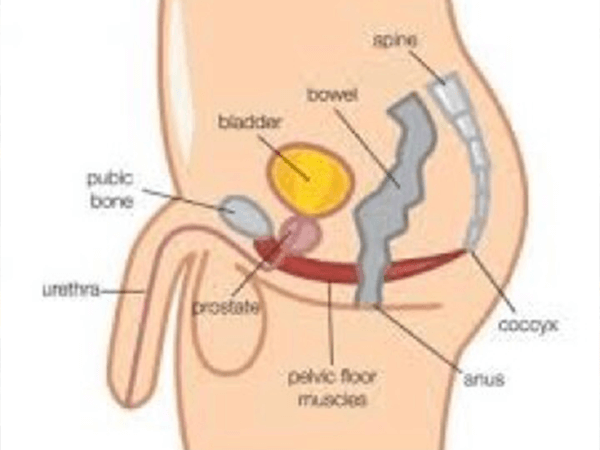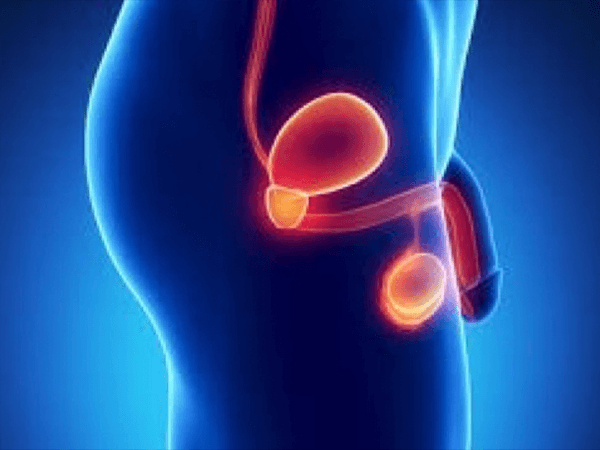Men have pelvic floor muscles too…
And these muscles can be the source of pain. Unfortunately, a lot of men have no idea they have pelvic floor muscles!.
Like women, men have muscles that sit below the bladder and bowel. The muscles work together as a group to help hold the bladder and bowel in place, give us extra control of our bladder and bowel if we need to hold on. The muscles also play a part in sexual function. The muscles are as big as two cupped hands and we can tighten them and relax them when we choose.

Unfortunately, these muscles can become tense for lots of reasons.
The pelvic floor muscles, like shoulder muscles seem to hold tension easily for some people.
A lot of people relate to the fact that shoulder muscles can become tight. The shoulder muscles become tight when we sit in hunched postures; working hard; forgetting to let our shoulder muscles have a break; forgetting to relax. The shoulder muscles also seem to hold tension when we are stressed: life is getting out of control, juggling work, family, relationships. We live in a high energy world!
Like the shoulder muscles, the pelvic floor muscles can hold excessive tension if you have that sort of lifestyle where its all go and no relax. Or perhaps relaxing for this type of person is running long distances, working out in the gym: in other words high energy relaxation rather than completely letting all your muscles switch off. It may be that a stressful time in life triggers the muscles into a stage of excess tension and from then on, the muscles seem more prone to tightening up. Tight muscles can cause pain in any part of the pelvis or pelvic organs.
Other injuries, such as typical sports injuries, can trigger pelvic floor muscle pain which might be felt as penile pain, testicular pain, pelvic pain, rectal pain, bladder pain etc.
It should be noted that your muscles might go into tension or spasm secondary to other problems: problems such as low back pain, a hip injury, a groin injury. In fact any sports type injury to the pelvic region can have an effect on the pelvic floor. You may be carrying a muscle weakness after for example a hip injury. You may be continuing your gym work or other work-outs and quietly in the background, your pelvic floor, as part of your “core” is working too hard and becoming tight. This is a common scenario that we see. It will all make sense if this is your story.
What sort of pain comes from the pelvic floor muscles?
We see men with all sorts of pains. Pain maybe in the “perineum” area: that is the area between back passage (anus) and base of penis. If you put your hand to this area, there is a group of several small muscles just behind the surface. You basically sit on them whenever you sit down. They contribute to erectile function and help bladder control. Normally, they just do their job in the background and you don’t know they are there. But when they become tight they can cause pain. They often develop painful “knots” or “trigger points”. When touched these trigger points refer pain to the testicles or to the penis or sometimes back towards back passage (anus). We used to think that trigger points had a specific pattern of pain referral. We now know that each person is different. Pain can be both sides or one side. Pain can shift from side to side. Everyone is different.
The deeper pelvic floor muscles can also be very much part of the problem
The deeper pelvic floor muscles are more difficult to reach but they can certainly become tight, have knots and trigger points. If required, the Physiotherapist can reach the muscles via rectal examination. But don’t be put off going to see the Physio! These muscles can first be felt from externally by running down from the coccyx (tailbone). The deep pelvic floor attaches to the coccyx on the right and left and can be treated with massage techniques from this approach. We would only ever examine via rectal examination because you feel the need to have this assessment done.
Does this affect erectile function?
In a word, yes. Many men will report change in erectile function. Unfortunately pain with erection or ejaculation can happen. This is not easy to talk about but Physios working in this area are, we hope, empathetic. Our aim is to help people to feel comfortable talking about these topics. After all, we talk about them most days! Sometimes men will tell us that although they didn’t mention it before, erectile function has improved with treatment. I have even had a case where a young man had had his pain for so many of his formative years that he didn’t know he had decreased erectile function until it improved dramatically after he had managed his pelvic pain problem.
What about bladder and bowel?
Again, pelvic floor muscle tightness can cause bladder symptoms such as increased frequency and difficulty emptying. We also see bowel emptying problems related to tight pelvic floor.
What does treatment involve?
As mentioned above, treatment is often in the form of what Physiotherapists call “manual therapy”: manual therapy is massage and release to particular muscles in the area. It also involves techniques to joints around the area. We may guide you with whole body relaxation, and help you to understand how the problem arose so we can undo the factors that caused the problem. We will teach you how to gently contract the muscles so you can start to feel the letting go. We call this “down training”.
How soon do I see results.
Time for results varies. I would say most men who come to see us have had the problem for a long time. They have been to see all sorts of Doctors who have scanned and looked and investigated and examined and have come up with no findings. If you are lucky, your Doctor will know to assess the muscles and will find the tightness and trigger points and refer to a dedicated Pelvic Floor Physio service like ours. We find that nearly everyone who comes in will see some results and changes straight away. The challenge is how to make the changes last by changing those lifestyle factors that are putting the muscles into tension.
What do I do now?
If you are suffering with pain in the pelvis and need help, make contact via our contact page. This page comes through directly to me, Caroline Bender. Remember we can also now offer Telehealth consults for which health funds will give rebates also.


